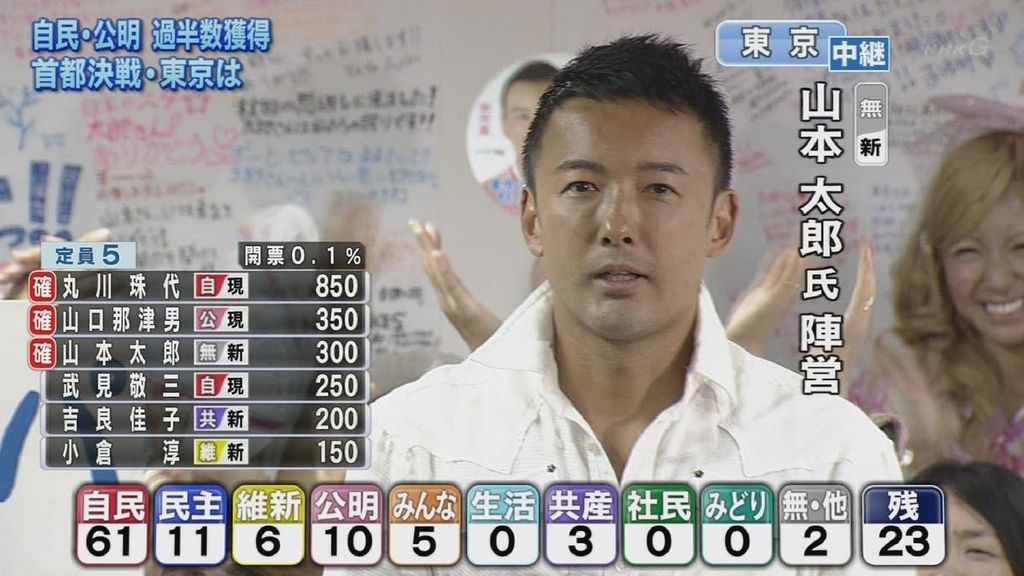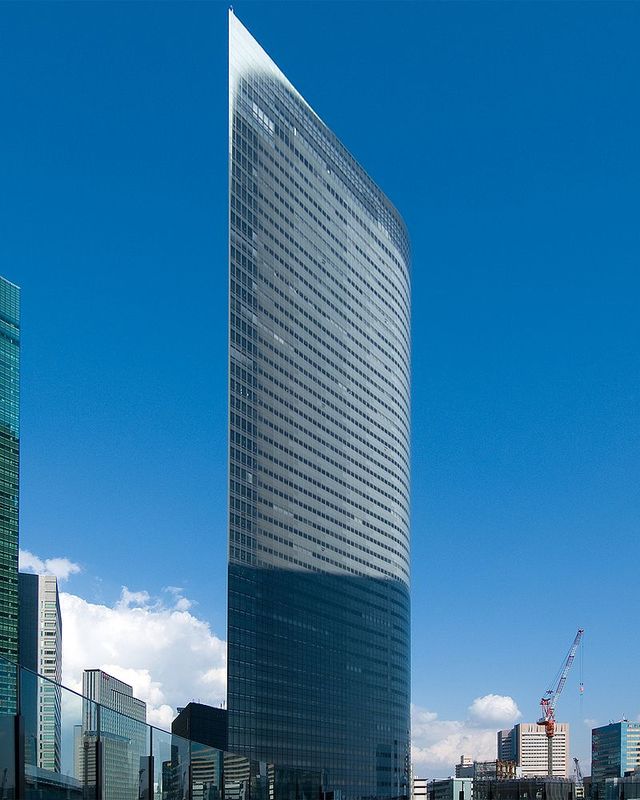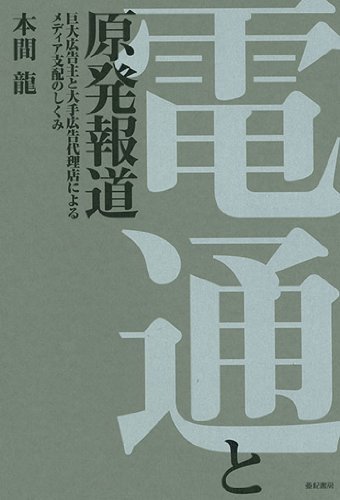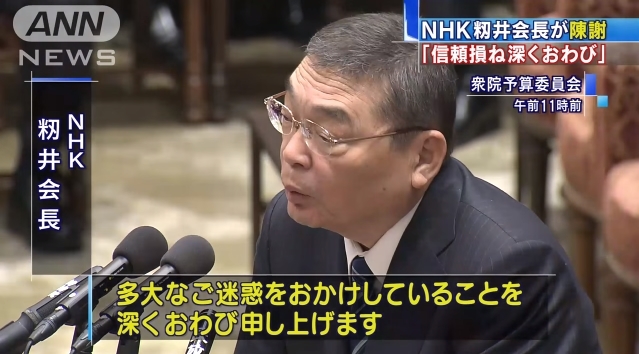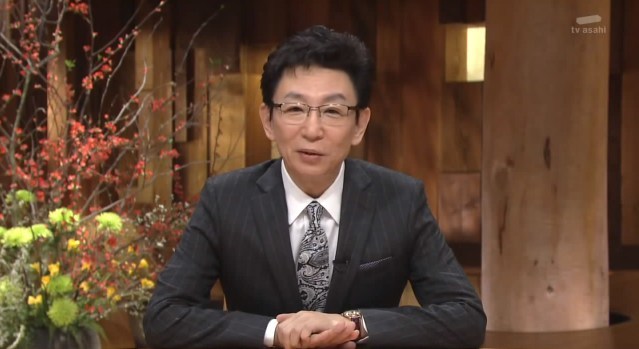Sachie Mizohata, Translation from French and Introduction
Original French article in INA Global
Japanese translation by Uchida Tatsuru (see May 15, 2016)
Introduction: How the Advertising Giant Dentsu Dominates Japanese Media Presentation on Nuclear Power?
French journalist Mathieu Gaulène describes the business practices of Dentsu and its competitor Hakuhodo, the biggest and the second biggest advertising companies of Japan respectively. Specifically, it examines how their close relations to the media and the nuclear industry play out in the wake of the 3.11 earthquake, tsunami and nuclear disaster. Focusing on Dentsu, Gaulène discusses how the marketing and public relations (PR) giant has dominated major media which large advertising contracts from the nuclear industry. The article is particularly timely as Dentsu unveils its deep ties to the Tokyo 2020 Olympic bid and the Panama Papers. Regrettably, however, with rare exceptions, there is little media coverage of the influence of Dentsu in mainstream Japanese newspapers and magazines.
According to the author, a partial translation of the French original was made by Kazparis (username), and quickly received more than 70,000 views on Twitter. Then, Uchida Tatsuru, a specialist in French literature, and HACK & SOCIETAS published two other Japanese translations. Soon after, Tokyo Shimbun and Mainichi Shimbun published long articles about Dentsu. SN
Summary
Dentsu, the fifth largest communication group in the world, holds a large share of the Japanese advertising market. This has an impact on media freedom in Japan, particularly in relation to the nuclear power industry. Much of this pressure is indirect.
– Dentsu and information on nuclear power
– Indirect pressures on press journalists
– The 2016 comeback of nuclear advertisements and the resignations of TV journalists
The moment remains famous. On the eve of Japan’s Upper House elections, former actor Yamamoto Taro, an independent candidate, campaigned on Twitter to win an upper house seat in the Diet. Large shut out by the media, the young candidate, famous for his verve, had mainly campaigned against nuclear power, but he also called out the big media, accusing it of being in the pay of sponsors and thus of electric companies and of systematically censoring critical information on nuclear power.
A television channel granted him an interview at the end of a program, but only after presenting a journalist to defend his profession. On screen, the young senator was given only one minute to respond. “I will take a simple example. Food can now hold up to 100 becquerels per kilogram; that means even just via eating we are irradiated. It is never said on television… ” Yamamoto had to stop. The ending jingle started, and the presenter at the studio announced, bantering, that the show was over, before launching the commercials.
The video, which was available online for 3 years, was removed on May 16, 2016 shortly after the publication of this article.
|
Yamamoto Taro on NHK, 21 July 2013 |
Advertisements in Japan are literally everywhere: a veritable hell of posters and screens in trains and stations. Giant posters on buildings are everywhere, bearers of advertising placards or lorries with huge posters and loud PA systems in the streets: even advertising displays mounted atop urinals in some restaurants. In the print media, naturally, as in France, major companies pay for full page advertisements. But, above all in television, variety shows. An entertainment show generally starts with the announcement of sponsors, and are interrupted every five minutes by numerous short advertising spots, where we often find the same sponsors. There is virtually no time for thinking, most TV channels offer programs close to the world of pachinko: garish colors, constant noise, and frat humor even of the most vulgar kind.
In this immense television arena, advertising is orchestrated by one of the global giants, Dentsu, the fifth largest communication group in the world and the number one ad agency. With its rival Hakuhodo, 2nd in the archipelago, the two agencies nicknamed “Denpaku,” combine advertising, public relations, media monitoring, crisis management for the largest Japanese and foreign companies, the local authorities, political parties or the government. Together they hold nearly 70% of the market – a true empire that some accuse of ruling the roost in the Japanese media.
In 2015, the Dentsu group secured nearly 7 billion euros in revenue, second only to the French Publicis with 9.6 billion euros during the same period. Most of Dentsu’s business is in TV advertisements. For example, Dentsu has created a commercial series for Softbank for almost ten years: the famous “Shirato” family characterized by a white dog as the father; an American black actor as the older brother; and Tommy Lee Jones as a housekeeper.
In July 2013, the group expanded internationally by acquiring the British company Aegis for 3.7 billion euros to establish the Dentsu Aegis Network in London. This international network, consisting of ten advertising agencies in more than 140 countries, allowed the Japanese to beef up their activities, particularly in digital marketing, and to secure a position in the international market which accounts for more than half of its total global business (54.3% in 2015). Dentsu employs 47,000 people worldwide, including 7,000 in Japan.
Dentsu and information on nuclear power
|
Dentsu headquarters, Shiodome |
Located in the business district of Shiodome, not far from Nippon TV, Fuji TV and the Asahi Shimbun newspaper, the Dentsu tower dominates the skyline with its imposing beauty. Designed by the French architect Jean Nouvel, its gentle curves and perfect glass walls soothe the eye. Inside the building, Mr. Kannan Shusaku, communications director of the group, receives us, all smiles for a visit of the site. The ground floor is filled with contemporary art, like a white chessboard by Yoko Ono. From there, elevators ferry employees towards different floors and rigorously separates departments. The group’s customers are the top 5 in each industry, and “everything is done so that employees working for competing enterprises never meet each other.” Mr. Kannan assures us. Dentsu obviously prizes transparency, but is its image that stainless?
|
Honma Ryu, Dentsu and Nuclear Coverage |
In a book published in 2012, Honma Ryu looked into Dentsu’s behind-the-scenes activities, and its tight control over the media, especially on behalf of one of its major clients: Tokyo Electric Power Company, Tepco. Honma worked for 18 years at Hakuhodo, then after a year imprisonment for fraud, he began writing, first about his prison experience, then about his years of advertising and the methods he used to coax the media. In 2012, his book Dentsu and Nuclear Coverage became a bestseller within a few months, despite almost universal media blackout.
Honma meticulously described the mechanisms by which Dentsu, the inevitable intermediary, implicitly imposes on media what can or cannot be written on nuclear power, and under what conditions. “Dentsu occupies a special position since the agency holds 80% of the market for nuclear advertising in Japan,” he reminded us during an interview in a coffee shop at Ueno Station. In 2010, in this huge advertising market, Tepco, a regional firm, indeed ranked 10th in terms of advertising expenses, next to Mitsubishi Heavy Industries. That year, on the eve of the Fukushima accident, Tepco had spent more than 2 million euros on advertising. The overall advertising expenses of the 10 regional electrical power companies amounted to 7 million euros.
For decades, especially since the 1990s when public opinion began to become critical of nuclear power following several accidents, Tepco and other power companies stepped up commercials and advertorials in the press.
On television, the advertisements can be enough in themselves to overwhelm criticism. Big groups often sponsor TV programs, talk shows or series for an entire season. Sometimes, entire documentaries are produced by Denjiren, [the Federation of Electric Power Companies of Japan (FEPC)], a key player in the nuclear lobby, to promote the industry. Any dissenting voice is unwelcome for fear of losing sponsors. After Fukushima, Yamamoto Taro paid the price; appearing regularly on TV as a tarento [talent] until then when he suddenly became persona non grata on TV for expressing opposition to nuclear power.
This is hardly new since the great figures of the antinuclear movement, bestselling authors such as Hirose Takashi or Koide Hiroaki are almost never invited to appear on TV, especially since the Fukushima accident. This “control by media” denounced by Honma Ryu obviously is not limited to the nuclear power industry. He reminds us of the case of the millions of Toyota vehicle recalls due to a defective accelerator pedal. It was necessary to wait until the Toyota CEO apologized to the U.S. Congress before that affair really appeared in the Japanese press. “No doubt the advertising agency had succeeded until then in preserving the image of its client, but when the scandal became too big and was in the public eye abroad, the media had no choice but to reveal the affair” he states.
It is hardly an exaggeration to say that apart from some programs such as “Hodo Station” on TV Asahi, which are sometimes critical of the government, TV news in Japan rarely address subjects that might offend one or another powerful group, relaying communications from the government without critically stepping back, and not introducing international news except when the subject involves Japanese citizens.
|
|
Amid all these private media groups, only NHK escapes this advertising empire and can claim to be independent, receiving its funding directly from viewers. Alas, the situation at NHK is even more disastrous, its president Momii Katsuto having said without embarrassment on several occasions that the company could not be indendent of the Abe government. In a recent statement before 200 retired NHK employees, he even appeared to acknowledge ordering NHK journalists to confine broadcasts to reassuring communiqués from the authorities about Kyushu earthquakes and potential risks they pose to nuclear plants and instructing them not to interview independent experts.
Indirect pressures on the press
What about the other media? Dentsu has long had a special relationship with Japan’s two big news agencies Kyodo News and Jiji Press: the three entities formed a single information group before the war. If information in the press is more difficult to control, Dentsu not only advertises, but provides after-sales customer service — media monitoring, advice on crisis management, and indirect pressure on newspapers.
Whereas in France, the acquisition of media companies by large industrial groups is the prelude to direct pressure, in Japan pressure comes via advertising agencies that act as true ambassadors for the groups. “I know very well how this happens, as Honma Ryu amusingly relates, I did the same thing when I was at Hakuhodo. If an incident occurs in a factory or a plant and the press reports it, Dentsu directly intervenes and visits the business department of the newspaper in question.” Things are done in the “Japanese” way. “We ask them politely to try to speak less about the case, not to put the article on the front page, or to publish it in the evening paper which is less read.” Such messages are directly transmitted by the business staff of the journal to top management.
Journalists will never know, but the next day their article will be relegated to the inside pages, or sometimes simply not published because of ‘lack of space.’ But, suspicions are numerous, and, Honma reports, after the publication of his book, many journalists came to see him confirming cases of censorship. Advertisements of nuclear power are mainly distributed in weekly and daily newspapers. Since the accident at the Fukushima nuclear plant, they stopped; but for Dentsu, a profitable new business emerged: promoting agricultural products from Fukushima. Since 2011, with the participation of star singers, Fukushima Prefecture has never skimped on promoting its peaches, rice, or tomatoes, with slogans like “Fukushima Pride” or “Fukushima is well!”
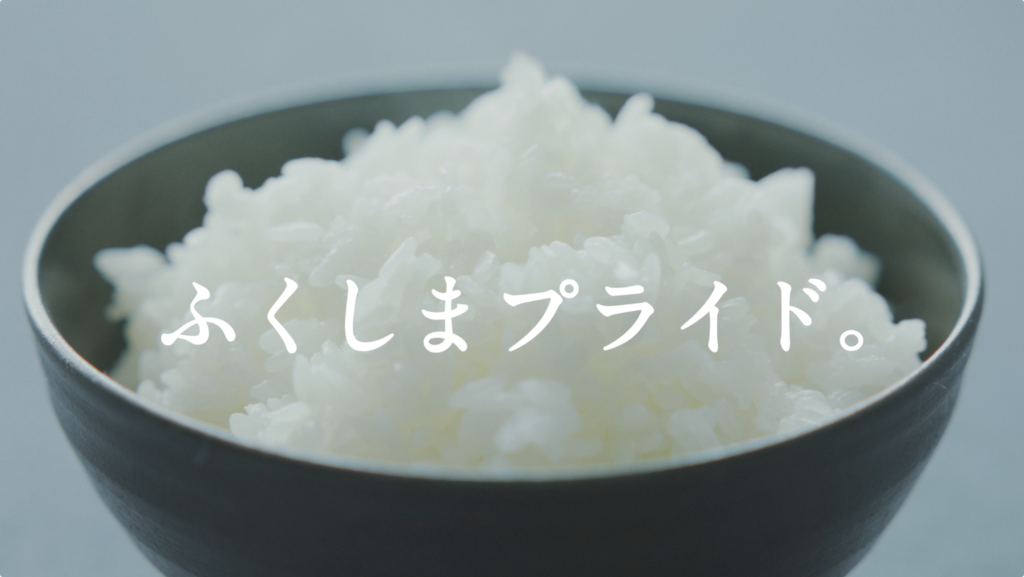 |
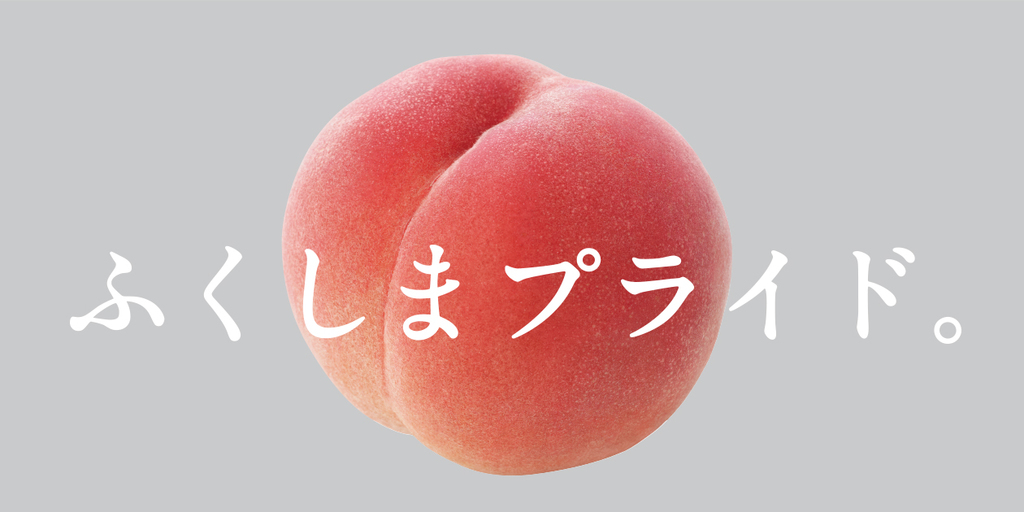 |
| “Fukushima Pride” | |
All this thanks to the help of Dentsu and Dentsu Public Relations (PR). “Dentsu PR also works for the METI [Ministry of Economy, Trade, and Industry],” explains Fujii Kyoko, Director of communications at Dentsu PR. “We organized free tours of Tohoku for foreign journalists, such as Thai and Malaysian journalists, to show that the region is recovering from the disaster.” And to expunge the surrounding radioactivity?
Dentsu thus occupies a very special position in the promotion of nuclear power, beside Tepco but also METI and the Liberal Democratic Party (LDP), both clients of the advertising company. Under these conditions, can Dentsu not be considered to actively underwrite the “nuclear village”? To this question, Mr. Kannan Shusaku, who received us in his office at the top of the Dentsu tower, answered without beating around the bush. “We have no power to influence the media and we do not practice politics.” Yet when asked why Dentsu is a member of the Japan Atomic Industrial Forum (JAIF), the main organization of nuclear lobbying, along with Japanese electric utility companies and EDF [Electricity of France, Électricité de France], Mr. Kannan became more circumspect. “I do not know this association… Really, are you sure?” he replied, slightly annoyed, before reaching for his smartphone. “Oh, yes, we are members. But, you know we are members of many associations. People ask us to send someone and sign, that’s all.” Apparently unconvinced by his own argument, he finally found a getaway and suddenly exclaimed: “You see, Hakuhodo is also a member!” obviously happy about not being the only one enlisted in the lobby.
The 2016 comeback of nuclear advertisements and resignations of TV journalists
For Honma Ryu, this is a sign of a resumption of promotion activities of nuclear power. “Hakuhodo has actually been a member of the JAIF for two years,” he explained, after the Fukushima accident. Obviously, having been sidelined for several decades from this gold mine of nuclear advertisements, the rival agency wants to restore its share in the promotion of nuclear power in the post-Fukushima era. These ads had, however, completely disappeared since the accident on March 11, 2011. After a final full-page apology in newspapers and broadcast on television by Tepco, the plant operators and manufacturers chose to keep a low profile, not broadcasting advertisements on nuclear power for five years.
But, although plant restarts have been hindered by dozens of lawsuits and general public opposition, promoting nuclear power has again become intense. After restarting one plant in 2015, 2016 is the year of a discreet comeback for nuclear advertisements. These now appear in newspapers and on local television of the prefectures with power stations. Honma reports that since February 2016, full-page advertisements have been published in Fukui Shimbun by the Kansai Electric Power Company, where the Takahama plant was closed a month after its restart due to a lawsuit filed by citizens. Tepco advertisements for restarting Kashiwazaki-Kariwa have also appeared in the Niigata Nippo and on local television in a particular context: the current governor is firmly antinuclear and opposes any restart, but elections will be held by the end of this year when his term ends. This resurgence of Tepco nuclear advertising, however, has raised the ire of Niigata citizens, especially refugees from Fukushima who have launched a petition to stop them.
The message of all of these advertisements is identical, revealing the hand of Dentsu behind the scenes. Electric companies promise to make every effort to ensure the safety of power plants, while photographs highlight the plight of nuclear workers who are often poor and sometimes dependent on jobs in the nuclear industry. According to Honma Ryu, these advertisements are only the tip of the iceberg. They are part of a campaign to closely monitor all information published on nuclear power, as well as the quasi-guarantee that local newspapers will limit the voice of opponents.
|
Furutachi Ichiro on “Hodo Station” |
In a report on press freedom released in April 2016, Reporters Without Borders ranked Japan 72nd, behind Hungary and Tanzania. Six years ago, it ranked 11th. Visiting Tokyo, a United Nations rapporteur alerted the country to the growing pressures on Japanese journalists who work for private media or NHK. This is because of increasing government pressure, exacerbated by the entry into force in the past year of a law on state secrets, including nuclear related matters. A law with vague outlines threatens journalists with imprisonment for disclosing “secret” information. A sign of the times is that three television journalists known for their independence announced their resignation at the beginning of the year. Among them is Furutachi Ichiro, presenter of “Hodo Station,” which, according to Honma Ryu, was targeted by Dentsu for several years because of his critical views on nuclear power and the Abe administration. No doubt Dentsu, privileged ambassador of the largest industrial groups, will continue to play its role in the great media lockdown ongoing in Japan.



